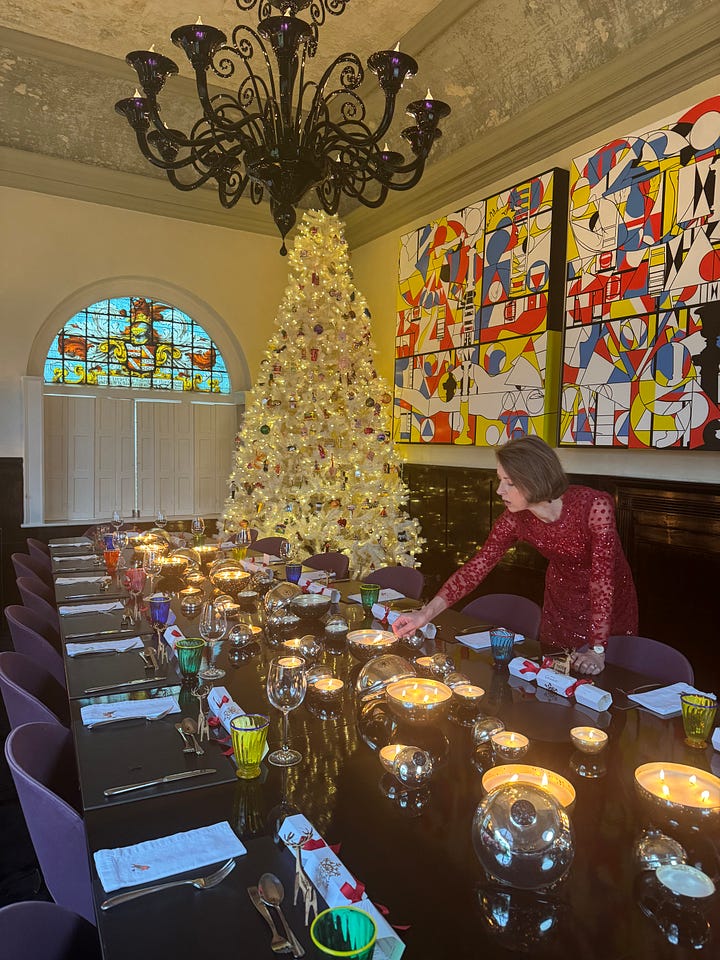

Kitchen rituals reveal their true value when put to the test. When our extended family gathered for Christmas, years of daily meal practices provided the foundation for handling larger gatherings with relative ease.
What made this possible wasn't elaborate planning, but the habits and patterns established through regular family meals over the years.
These rituals go beyond just timing - they're about finding a natural flow in the kitchen through regular practice: knowing when to start each preparation step, understanding how different dishes interact, feeling the natural rhythm of cooking, cleaning, and resetting for the next meal.
I'd been thinking about how modern life seems to be losing its rituals - those regular practices that give our days structure and meaning. Reading philosopher Byung-Chul Han's observations on this really resonated as I watched our family move through these familiar kitchen patterns.
Just as any sustained practice develops its own natural cadence - work, assess, adjust; work, rest, work - preparing family meals follows similar patterns. Over years, these kitchen rituals create not just nourishment but moments of connection. When you discover the natural flow of an activity, the structure doesn't constrain; it liberates.
The significance of these rituals extends beyond cooking. Sociologist Robert Bellah describes them as "practices of commitment" that unite individuals within moral communities.
Each evening, as family members engage in familiar routines like setting the table, lighting candles, and loading the dishwasher, they're not just completing ordinary tasks. They're expressing family identity and belonging, built through years of shared meals.
This becomes particularly important in our fragmented modern world. While many families now eat in shifts or rely heavily on takeouts, maintaining regular family meals creates what anthropologist Mary Douglas calls "frames of meaning" - reliable patterns that help us interpret our experiences.
The discipline required isn't just about cooking skills; it's about sustaining focus and quality through a continuous cycle of planning, preparing, and serving.
During the Christmas period, this involved coordinating Christmas Day, Boxing Day and New Year's Day lunches for 21 people, along with daily meals for 8-14 people in between. Managing meals at this scale might sound restrictive, but here's the surprising truth: tight organisation actually creates freedom.
When everyone knows dinner will always be ready at a specific time, they can plan their activities with confidence. There's no need for constant check-ins or last-minute coordination. The structure provides a foundation that allows other aspects of family life to flourish.
These patterns developed gradually, through years of trial and error. What works isn't perfection but consistency - finding times and routines that suit your family's natural rhythms and protecting them.
Shopping becomes strategic, understanding what's needed for different types of meals. Preparation follows a natural sequence, each step building on the last.
This isn't about being rigid; it's about creating a flow that enables quality cooking at any scale.
A well-organised kitchen creates its own kind of freedom. When the preparation space is reset after each meal, ingredients stocked, and equipment in place, there's room for creativity in cooking.
You can't experiment successfully in chaos - you need a clear foundation. This becomes especially important when adapting meals for different dietary needs while maintaining the same standards for everyone.
For instance, during Christmas, we catered to individuals following pescatarian, gluten-free, and carnivorous diets, as well as young children.
During busy periods like holidays, these daily patterns simply scale up. In fact the true challenge for me lay in maintaining quality and timing throughout the meals in between the larger events.
The focused rhythm remains: shopping completed by 11AM, lunch at 1PM, dinner preparation beginning at its usual hour - 5:30PM. Each meal builds on the organisation of the previous one, creating a sustainable pattern that can handle varying numbers without compromising quality.
This approach contrasts sharply with fragmented eating patterns. When family members can rely on consistent shared meals - knowing food will be ready at the promised time and to the expected standard - it actually reduces rather than increases constraints on their time.
No one needs to wonder about meal plans or make backup arrangements. The structure creates clarity and freedom rather than limitation.
For families wanting to build their own mealtime culture, remember that these patterns develop gradually. Start with one consistent meal time and protect it.
Begin with manageable menus and build your repertoire. Develop your systems step by step, finding rhythms that work for your family's situation.
Here's what I've learned from years of cooking family meals:
First, timing matters more than menu complexity. Choose a realistic dinner time that works most days and stick to it. When children know exactly when dinner will be ready, they develop their own routines around it. Consistency builds trust - they learn that when you say dinner is at a certain time, it will be.
Second, treat your kitchen like a professional workspace. A clean, organised kitchen makes everything else possible. When cooking utensils are where they should be, counters clear, and ingredients to hand, you can focus on cooking rather than managing chaos. This foundation becomes especially valuable when cooking for larger groups.
Third, think in terms of systems rather than individual meals. Have standard breakfast options, reliable weekly dinner patterns, and proven recipes that work for different numbers.
This reduces mental load - you're not starting from scratch each time but executing a proven plan. During holidays like Christmas, these systems naturally scale up rather than requiring a completely new approach.
These aren't just practical arrangements - they're the foundation of family culture. When children grow up with reliable mealtimes, experiencing the rhythm of preparation and sharing, they internalise patterns that can last generations.
These habits pass naturally from one generation to the next. I see this now in how my adult children instinctively assume their roles during meal preparations, requiring no direction.
This isn't about achieving perfection; it's about establishing reliable patterns that nurture family life—patterns that become most evident during intensive periods, such as the Christmas holidays.
In our increasingly fragmented world, where shared meals often yield to individual schedules and quick convenience foods, these rituals offer what philosopher Han refers to as "temporal footholds" stable points that help us navigate our increasingly disjointed reality.
As four generations gathered in our kitchen this Christmas, the power of family rituals was clear. These daily practices - the simple acts of preparing and sharing meals together - create connections that time cannot erode.
In a world that increasingly lacks structure, our kitchen rituals remind us of something vital: how regular practices build lasting bonds, and how these bonds strengthen generation after generation.
"They broke bread in their homes and ate together with glad and sincere hearts" Acts 2:46





I really enjoyed this read re flow patterns and security ! I’d be so interested to know what you actually cooked ! I’m daunted by large numbers. !